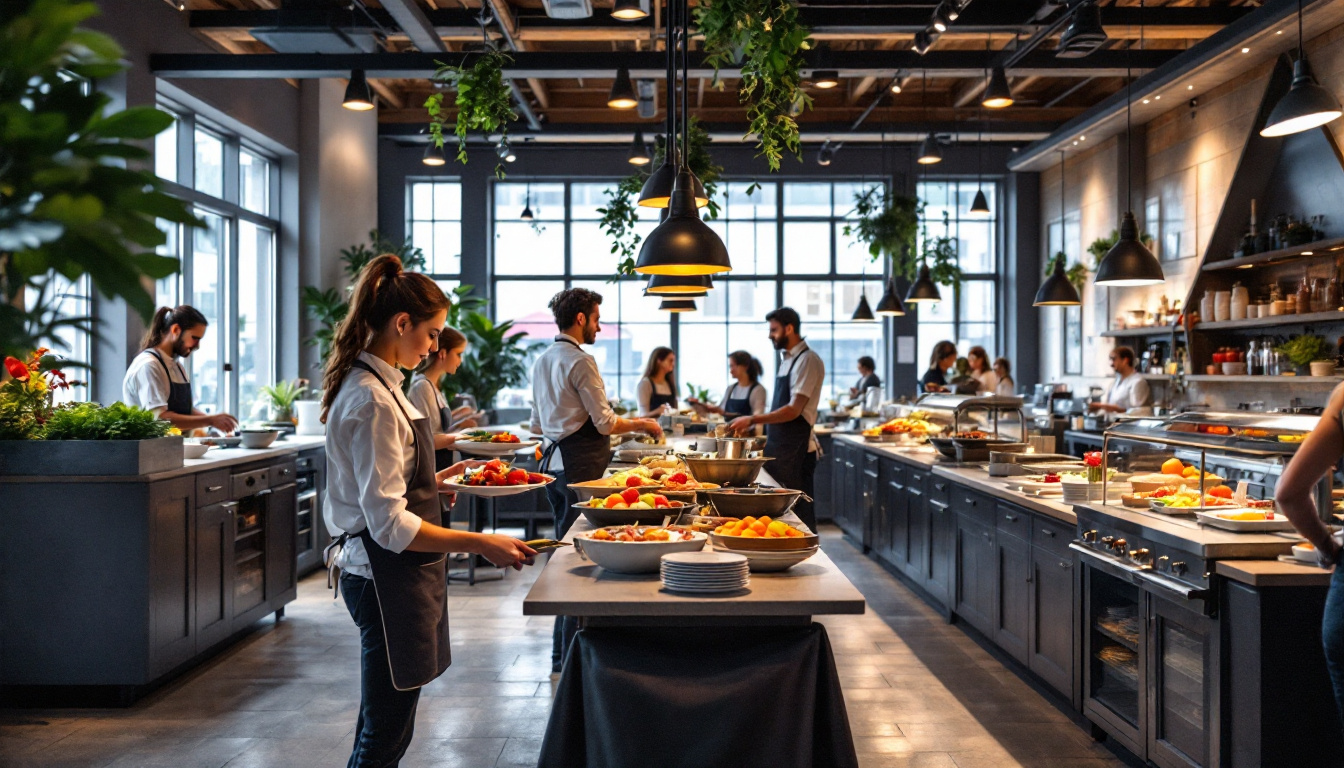How to start a Catering Business: A Step-by-Step Guide
This article was assisted with AI. We may include links to partners.
Starting a catering business can be a thrilling adventure filled with creativity, delicious food, and opportunities to bring people together. However, diving into this rewarding world requires careful planning and preparation. In this guide, we’ll walk you through every essential step on how to start your catering business, ensuring you have a clear roadmap to success and helping you make your dreams a reality.
Understanding the Catering Business Landscape
The catering business is diverse and ever-growing, offering a wide variety of services from corporate events to wedding receptions and everything in between. Understanding this landscape is crucial for determining how you want to shape your business. Let’s take a closer look at some of the key aspects.

The Basics of Catering
Catering is all about providing food and beverages for clients during special events. It’s not just about cooking; it involves planning, preparing, and delivering an exceptional experience. You’ll be responsible for creating menus, setting up, serving, and even cleaning up after events. Imagine the joy of being a part of memorable celebrations! Each event presents a unique set of challenges and opportunities, from accommodating dietary restrictions to managing timelines. The ability to adapt and respond to the specific needs of each client can set you apart in this competitive field.
Identifying Your Catering Niche
Finding your niche is essential for standing out in the catering industry. Are you focusing on high-end weddings, casual corporate lunches, or maybe healthy meal prep for busy individuals? Your unique offerings can define your brand and appeal to a specific audience. You might consider experimenting with different themes or cuisines to discover what resonates with you and your potential clients. Additionally, understanding current food trends can help you refine your niche. For instance, with the rise of plant-based diets, incorporating vegan or vegetarian options into your menu could attract a broader clientele. Networking with event planners and attending industry expos can also provide valuable insights into what clients are looking for, allowing you to tailor your services accordingly.
Crafting Your Catering Business Plan
Now that you have a grasp on the catering landscape, it’s time to create a solid business plan – which is arguable the first step in starting a catering business. This document will serve as your blueprint and guide you as you build your business. It may sound daunting, but breaking it into smaller parts can make the process much more manageable.

Defining Your Business Objectives
What do you want to achieve with your catering business? Setting clear, achievable objectives is crucial. Whether it’s working with a certain number of clients a month or reaching a specific revenue goal, having objectives gives you direction and motivation. You could even jot down your dreams for the future—what does success look like for you? Consider incorporating both short-term and long-term goals; for instance, in the short term, you might aim to establish a strong local presence, while in the long term, you could envision expanding your services to include event planning or even franchising your brand.
Financial Planning for Your Catering Business
Money matters can seem overwhelming when you are thinking to start a catering business, but they are an essential part of your business plan. Start by estimating your startup costs, which might include equipment, supplies, marketing, and expenses for permits. Don’t forget to factor in ongoing costs like ingredients, transportation, and staff wages. Additionally, it’s wise to create a budget that includes a buffer for unexpected expenses, such as equipment repairs or last-minute ingredient purchases, which can often arise in the catering industry.
Consider using a free website builder like Solo AI to create a stunning online presence. You can customize your domain name for free, and this mobile-friendly, SEO-optimized site will help you attract clients and showcase your delicious offerings effectively! Furthermore, think about integrating a blog into your website where you can share recipes, catering tips, and event highlights. This not only positions you as an expert in your field but also helps with search engine visibility, drawing in potential clients who are searching for catering services online.
Legal Considerations for Your Catering Business
Before you start cooking up a storm, you’ll need to address some legalities when you want to consider to start a catering business. Taking care of the paperwork can seem tedious, but it’s vital to protect your business and ensure everything runs smoothly.

Business Registration and Licensing
First things first: make sure you register your business and obtain any necessary licenses. This may vary based on location, so it’s a good idea to research local regulations. Consider consulting with a business advisor if you feel unsure about where to start.
Remember, following these regulations not only helps you avoid legal issues down the road but also builds trust with your clients. They’ll appreciate knowing that your business complies with local laws and standards – which very important to have in mind when you want to start a catering business. Additionally, securing the right permits can open doors to new opportunities, such as catering for larger events or working with corporate clients, who often require proof of compliance before hiring a service.
Health and Safety Regulations
When it comes to food, safety is paramount. Familiarize yourself with health codes in your area. This might include food handling procedures, employee hygiene standards, and kitchen inspections. Completing a food safety course can also provide valuable knowledge and even enhance your credentials.
Moreover, consider implementing a robust food safety management system in your kitchen. This could involve regular training sessions for your staff, keeping detailed logs of food temperatures, and conducting routine audits of your processes. By establishing a culture of safety and accountability, you not only protect your customers but also foster a professional environment that can lead to greater employee satisfaction and retention. Remember, a well-trained team is your best asset in maintaining high standards and minimizing risks associated with foodborne illnesses.
Setting Up Your Catering Kitchen
With the legal stuff sorted, let’s talk about your workspace. Your kitchen will be the heart of your catering business, so it’s essential to set it up efficiently and effectively. The right setup will help you create delicious meals while maintaining organization. A well-designed kitchen not only enhances productivity but also fosters creativity, allowing you to experiment with flavors and presentation that can set your catering service apart from the competition.
Choosing the Right Equipment
Investing in the right catering equipment is key to your success. Essentials include cooking appliances, serving dishes, and transport containers. Think about the scale of your operations—will you cater for small gatherings or large parties? Plan accordingly and opt for tools that suit your needs. You don’t have to break the bank; consider purchasing high-quality used equipment as well. Additionally, don’t overlook the importance of small tools like knives, cutting boards, and measuring devices, as they can significantly impact the efficiency and quality of your food preparation. A well-stocked kitchen will not only save you time but also help you deliver consistently excellent results, which is crucial for building a loyal client base.
Food Storage and Preparation Guidelines
Proper food storage is crucial to ensure the safety and freshness of your meals. Create a system for organizing your ingredients and leftovers, and always label your products clearly. Adopt safe cooking practices and maintain a clean workspace to keep your clients coming back for more! Consider investing in high-quality storage containers that are airtight and stackable, as they can help maximize your space and keep your ingredients at their best. Moreover, implementing a first-in, first-out (FIFO) method for your inventory will help minimize waste and ensure that you are always using the freshest ingredients possible. This attention to detail not only enhances the quality of your dishes but also reflects your commitment to excellence in every aspect of your catering service.
Building Your Catering Team
The right team can make all the difference in your catering business. Although you may start as a solopreneur, but as your team grows when you want to start a catering business, there may come a time when you need extra hands to manage events efficiently. So, let’s explore how to build a capable and dedicated catering team.
Hiring and Training Staff
When hiring staff, look for individuals who share your passion for food and service. Not only should they possess the necessary skills, but they should also align with your company culture. Create a warm and positive environment where everyone feels valued.
Training is also crucial as you consider to start a catering business—ensure your team understands food safety, service techniques, and your specific catering style. A cohesive team can deliver an exceptional experience every time! Consider implementing a mentorship program where seasoned staff can guide newcomers, sharing insights and best practices. This not only accelerates the learning curve but also fosters a sense of community within your team, making everyone feel invested in the success of the business.
Roles and Responsibilities within Your Team
As your team grows, wjclearly defining roles and responsibilities will help streamline operations. Each person should know their tasks during events, from cooking to serving and cleaning up afterward. Regular team meetings can foster communication and collaboration, enhancing overall performance.
In your catering business, you get to create lasting memories and bring people together. By following this checklist, you’ll be well on your way to launching a successful venture. Embrace the journey ahead, and let your passion for food shine through every dish you serve! Additionally, consider cross-training your staff so they can step into different roles when needed. This flexibility can be invaluable during busy events and helps to create a more versatile team. Encourage open feedback sessions where team members can share their experiences and suggestions for improvement, ensuring that everyone feels heard and contributing to the growth of the business.
Launch Your Catering Business Online with Solo
Ready to take the next step in your catering business journey? With Solo, you can create a professional website that showcases your culinary creations and services to the world. Our AI-driven platform is designed for entrepreneurs like you, making it easy to launch a visually stunning, SEO-optimized website without any coding skills. Connect with clients, manage bookings, and grow your brand with a mobile-responsive site that reflects your passion for food and events. Today you can Create your catering business website today and watch your catering business flourish!
Create your website with Solo today and watch your business grow!
